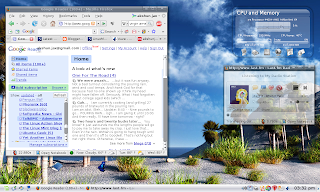The bandwagon I'm NOT on, but that's okay...
So, it looks like Google went out and wrote themselves a web browser. Chrome is the official name, and like all things Google, it was rushed to market with bugs, flaws, and no support for Linux or Mac. As I am a self-professed Google-groupie, I can forgive these things. I know that soon, Chrome will support all platforms, and the bugs will be ironed out. I actually like the fact that Google pushes out beta-class stuff. Plenty of software toys for a geek like me to tinker around with is a good thing.
But will I use Chrome? Probably not. Yes, you heard me right. As a Linux user, I have about a dozen web browsers to fool around with including Firefox, Mozilla, Opera, Konqeror, Epiphany, Flock, K-Meleon, Amaya, and even Internet Explorer (yes, you can run IE on Linux). Firefox is clearly the best of breed for a few reasons:
A $200 laptop "netbook" weighing in at two pounds, booting up in 10 seconds via a tiny, embedded version of Linux that really does nothing other than provide essential functionality with the hardware and an internet connection. Then you launch Google's Chrome to connect to all your online applications. THAT'S what Google is after. All they're doing right now is rattling the spurs...
But will I use Chrome? Probably not. Yes, you heard me right. As a Linux user, I have about a dozen web browsers to fool around with including Firefox, Mozilla, Opera, Konqeror, Epiphany, Flock, K-Meleon, Amaya, and even Internet Explorer (yes, you can run IE on Linux). Firefox is clearly the best of breed for a few reasons:
- Marketshare - With 25% of the market, 99% of all websites FINALLY support Firefox! So, it's a rare day that you run across a website that demands Internet Exploder. Although, every once in a while, it happens. AT&T, it's time to step up your game...
- Customization - Through extensions and skins, you can turn Firefox into a little slice of home. My essentials? DownloadHelper, Google Notebook, and Google Toolbar. Somebody stop me!
- Development Cycle - "Active" is one way to describe Firefox's development cylce. "Insane" would be more accurate. Firefox was born in early 2001 during the aftermath of Browser Wars I, when IE delivered a resounding defeat to Netscape. During that time period, the Firefox developers understood the most important lesson of Browser Wars I: INNOVATE OR DIE! Thus Firefox later sparked the Browser Wars II by simply out-innovating Microsoft's IE every few months.
- Multi-platform support - Windows, Linux, Mac? Firefox loves you all the same...
- Polished end-user experience - Firefox doesn't feel like a beta, like a lot of other open source software. It looks and feels like a finished product. Personally, this doesn't mean a lot to *me*, but for normal folk like my wife, it means everything.
A $200 laptop "netbook" weighing in at two pounds, booting up in 10 seconds via a tiny, embedded version of Linux that really does nothing other than provide essential functionality with the hardware and an internet connection. Then you launch Google's Chrome to connect to all your online applications. THAT'S what Google is after. All they're doing right now is rattling the spurs...


Comments